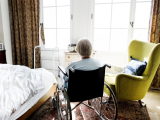The Center for Infectious Disease Research and Policy (CIDRAP) launched the "Stop Swapping Air" public service messaging campaign this week in partnership with Clear Channel Outdoor Holdings, Inc., a New York–based national outdoor billboard advertising company.
The phrase "Stop Swapping Air" was coined on an episode of the Osterholm Update: COVID-19 podcast, hosted by infectious disease expert Dr. Michael Osterholm, PhD, MPH, director of CIDRAP at the University of Minnesota and newly appointed member of President-elect Joe Biden's coronavirus task force. CIDRAP publishes CIDRAP News.
The campaign is based on the idea that the best way to protect yourself and others from COVID-19 is to avoid sharing air by not spending time in enclosed spaces with people who are not in your "pod"—a small number of trusted people who are also not having contact with others, most commonly immediate family.
8-week billboard campaign
The 8-week campaign will feature billboards in the Minneapolis–St. Paul metro area with the phrase, "Stop Swapping Air," to reinforce the message that not swapping air is the most effective step you can take right now to protect yourself, your family, friends, and colleagues. If successful, Clear Channel may expand the campaign to other national markets.
SARS-CoV-2, the virus that causes COVID-19, can be spread from person to person through the air. When people breathe, talk, yell, laugh, or sing, they create aerosols, which are tiny particles that can float in the air for minutes to hours, like the floating dust particles that you can see in sun streaming through a window.
Sharing indoor air with someone who is infected with the virus raises the risk of breathing in the virus and becoming infected. Special forms of breathing protection, such as N95 respirators, can protect you from breathing in aerosols. But cloth face coverings are not designed to filter out such small particles, and they also may enter through the gaps around the cloth.
Need for more effective messaging
"It's clear that public health messaging is having, at best, limited impact on the transmission of the virus," Osterholm said. "What I kept hearing from people in the public is 'what should we be doing?' People were confused about the mode of transmission."
"It's about breathing air that has the virus floating in it, and that happens when someone has just exhaled the virus in close proximity to you. It's swapping air. That's the main thrust of the transmission challenge today, and we're trying to draw attention to that. If you stop swapping air you won't get infected," he said.
Osterholm highlighted the importance of the "Stop Swapping Air" message as we move into the holiday season. "The ultimate act of love this year will be not sharing this virus with loved ones, and one of the ways to do that is to stop swapping air with others who are infected," he said.
Resources to support organizations
CIDRAP is building content on an accompanying website with information about how to spread the message via social media—#StopSwappingAir—resources for how to stay connected with loved ones without swapping air, and links to support pandemic-related organizations.
The campaign partnership arose out of an existing relationship between Clear Channel and the University of Minnesota Foundation (UMF), a fundraising and philanthropic nonprofit organization supporting University of Minnesota initiatives.
Clear Channel is one of the world's largest outdoor advertising companies.
"Our goal is to be a responsible member of the communities we serve by taking a proactive role in making our neighborhoods better places to live," said Dan Ballard, president of Clear Channel Outdoor, Minneapolis/St. Paul. "We believe addressing the challenges, big and small, that affect people's daily lives is critical for influencing greater societal change."





















